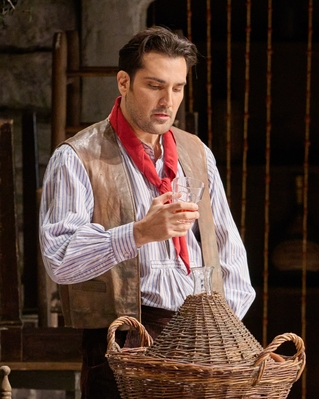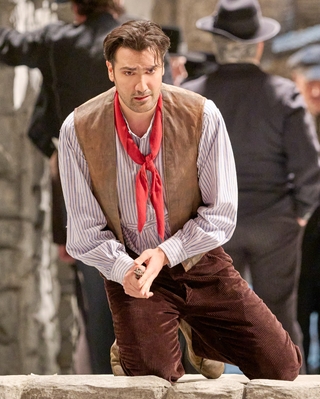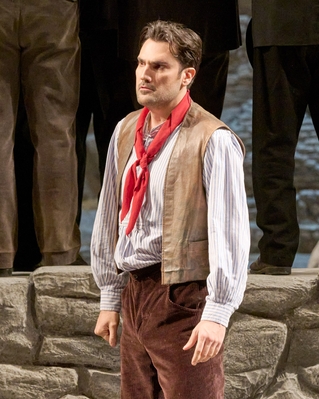This Guy is a Star
News |
After his successful state opera debut last season, Jonathan Tetelman sings another of his favorite roles: Cavaradossi in Tosca.
They do exist, the decisive moments. When Leonard Bernstein stood in for the great conductor Bruno Walter, his name became known throughout the cultural world. The same happened to pianist Yuja Wang, who took over for Martha Argerich. And Jonathan Tetelman's career also received a decisive boost when he took to the stage as Rodolfo for Piotr Beczała at the Tanglewood Festival.
Of course, all of these careers would have developed anyway. But the "widescreen effect", the sudden career boom, often comes from a single evening like that. But do you know at such moments that it's happening now? That everyone's ears are pricked up, that expectations are growing, that the big opportunity is within reach?
To be honest, I had no idea what I was letting myself in for when I accepted at short notice.
Luckily, I had already sung the role and came straight from another La bohème project. The stars were aligned - it was a God-given moment. I was lucky enough to get this chance - and to make the most of it.
That was in 2018. Today, what was spectacularly announced back then has been realized. Tetelman sings in Vienna and San Francisco, in New York and London, in Berlin and Salzburg. The New York Times called him an "absolute star", the Salzburger Nachrichten rejoiced: "The future belongs to this voice."
How did he get here? Born in Chile and raised in Princeton (USA), a music teacher discovered him when he was singing at the age of eight. This was followed by music studies - but also detours: Tetelman worked as a DJ and promoter, but always felt that this was not his true path. He found it in classical music. Initially as a baritone, until he discovered his calling as a tenor.
"I like to say that I was 'misdiagnosed' as a baritone," says Tetelman. "But it was a necessary part of my development. Singing tenor roles at 18 is very demanding. Some baritone repertoire can be a catalyst." And he quotes Daniel Barenboim: "We have to be careful that our ambitions don't overshadow our current abilities."
This mentions a key word: being able to say "no". "No" to the wrong role, at the wrong moment - that can make or break a long, healthy career. But of course you also need talent, technique, strong nerves, passion and acting power. And yet that alone is not enough. "The most important thing is dedication," emphasizes Tetelman. "You have to be obsessed with developing your voice and your skills. Talent alone is not enough. To stand out from tens of thousands, you need a deep hunger for learning and expression."
If you look at his calendar, one name comes up again and again: Giacomo Puccini. Pinkerton, Ruggero, Rodolfo, Cavaradossi - across the metropolises of the opera world. Plus a Puccini CD released in 2023 with highlights from Turandot, Manon Lescaut, La bohème, Tosca and Le villi. "Puccini constantly pushes you to the limits of your instrument and your emotions," says Tetelman. Cavaradossi in particular is not only a great role for him, but also a character model.
In January 2025, he made his state opera debut as Turiddu in Cavalleria rusticana. He previously told Opernring 2 magazine: "I believe that my voice is the real me. It's the part of me that always wants to say something - and only finds the opportunity to do so in music and theater. I would be lost without my voice."
And how does he see opera in the 21st century?
We no longer live in an age of pure standing and singing theater. But we are also not totally dependent on digital means.
There are many new ideas, including risks.
I would like to see more digital stage sets in order to reach the next generation. Opera is participation - so we need to find more ways to present it and capture the attention of a technologically savvy generation.



